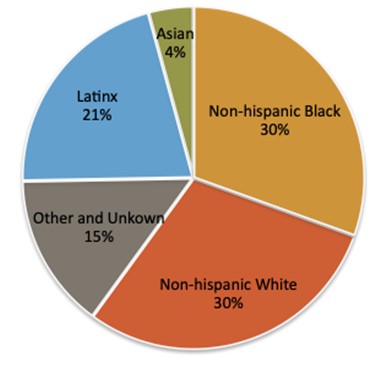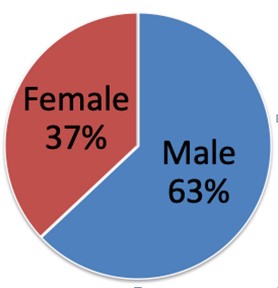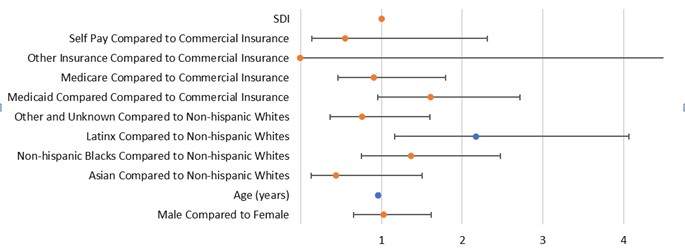Session Information
Date: Sunday, November 12, 2023
Title: (0510–0542) Spondyloarthritis Including Psoriatic Arthritis – Treatment: AxSpA Poster I
Session Type: Poster Session A
Session Time: 9:00AM-11:00AM
Background/Purpose: Ankylosing spondylitis (AS) is estimated to affect up to 1,647,500 Americans, resulting in significant disability and lost productivity for affected individuals. Biologic medications reduce disease activity and improve functional outcome in those with AS, but they are expensive and may be difficult to access. Individuals of lower socioeconomic status (SES), minorities (specifically African American or Latinx), and women may be less likely to receive biologic treatment, resulting in poorer functional outcomes The objective of this study was two-fold: 1) to develop a multi-ethnic longitudinal AS cohort for analysis of clinical features, demographics, SES, race/ethnicity, sex and treatment patterns and 2) to analyze the effects of these factors on the prescription of a biologic agent.
Methods: Data from the electronic medical record of an urban academic health system were analyzed between January 1, 2010 and September 12, 2020.Subjects had at least one ambulatory encounter and diagnostic codes of M45 (ICD-10) or 720 (ICD-9). Independent variables included insurance information, address with zip code, race/ethnicity and sex. Social Deprivation Index (SDI) was utilized as a measure of SES. Patients were removed from the analysis if they were in a correctional facility or did not list a residential address in the chart. The dependent variable was prescription of at least one biologic medication. Multivariate logistic regression was performed using R Statistical Programming Software.
Results: Our cohort included 430 patients total; 423 were included in the multivariate analysis. Seven patients were removed due to lack of SDI information. Non-Hispanic Blacks made up 30% of the cohort, with Latinx and Non-Hispanic Whites representing 21% and 30% respectively (Fig 1). Women made up 37% of the cohort (Fig 2). Men were prescribed biologic agents more often than women. Non-Hispanic Blacks and Latinx had increased odds of receiving biologic therapy compared with Non-Hispanic Whites. Insurance status and SDI did not affect the odds of receiving a biologic agent. The odds of receiving biologic therapy decreased 0.962 (CI 0.946, 0.978) with each year of age (Fig 3).
Conclusion: In a large multiethnic cohort of patients with AS, biologic therapy was prescribed more often for males, Non-Hispanic Blacks and Latinx. Low SES, measured by SDI, and insurance status did not affect the odds of receiving a biologic agent. This study suggests that SES did not prevent patients with AS from receiving biologic therapy. The reasons for differential prescribing by race/ethnicity would benefit from further study.
To cite this abstract in AMA style:
TROY E, Chan Z, GALLANTER W, Adams E, Al-Awqati M, Chang H. Pharmacologic Treatment of Ankylosing Spondylitis in a Large Urban Medical Center: Effects of Socioeconomic Status, Race/Ethnicity and Sex [abstract]. Arthritis Rheumatol. 2023; 75 (suppl 9). https://acrabstracts.org/abstract/pharmacologic-treatment-of-ankylosing-spondylitis-in-a-large-urban-medical-center-effects-of-socioeconomic-status-race-ethnicity-and-sex/. Accessed .« Back to ACR Convergence 2023
ACR Meeting Abstracts - https://acrabstracts.org/abstract/pharmacologic-treatment-of-ankylosing-spondylitis-in-a-large-urban-medical-center-effects-of-socioeconomic-status-race-ethnicity-and-sex/



